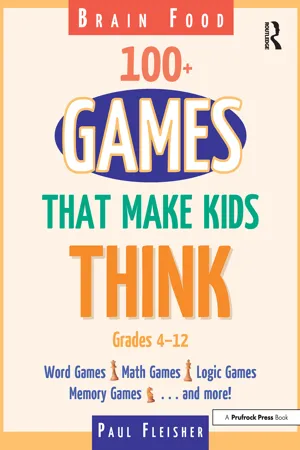
- 210 pages
- English
- ePUB (mobile friendly)
- Available on iOS & Android
About This Book
Be the one to make a difference in your students' thinking! With more than 100 games to choose from, Brain Food is your one-stop source for exploring the fun in learning. This compilation is filled with new as well as traditional brain games, and most need little more than paper and a pencil to get you started. Each game is classroom tested and tailored to encourage cooperation and teamwork as well as deductive logic. The book includes:
- word games,
- math games,
- logic games,
- memory games, and
- much more!
One exciting aspect of this book is that it has a bit of an international flavor. It is filled with fun games from around the world that challenge and stimulate young minds. From the Japanese strategy game Hasami Shogi, to the traditional African game Wari, to the deductive game Witch Hunt, to the word challenge Wordbuilder, these mind-stretching tools encourage complex thinking skills.Games by their very nature require thinking. With Brain Food you'll get teaching tools such as Alphamazement—a game of strategy that challenges both visual and verbal skills by having players connect letters of the alphabet in a zigzagging maze. Or, try the traditional Maori game Mu-Torere to enhance visual and mathematical skills.Grades 4-12
Frequently asked questions
Information
A Few General Notes
Choosing Who Will Play First
Tokens
Word Games
- ■ Use the best, most comprehensive dictionary you can find as judge. Use it to decide whether a certain word is a real word or is spelled correctly.
- ■ Don't allow proper nouns or the adjective form of proper nouns. For example, neither France nor French may be used in a game of Ghost or Matrix.
- ■ Don't allow words and phrases from languages other than the language in which you are playing the game unless the words have become part of that language. Bonjour and gracias would not be permitted in a game in which you are using English only. However, words such as rendezvous and fiesta would be. As always, let the dictionary be your guide.
- ■ Don't allow abbreviations, contractions, or acronyms. Words must be spelled out completely. Doesn't, he's, Tues., NY, or P. S. should not be accepted. Neither should NASA, MOMA, or POTUS.
Pronoun Gender
Spatial Orientation and Strategy Games
Dots
| Number of Players | 2 to 4 |
| Object | To create the most squares by drawing lines between adjacent dots on the playing board |
| Materials | copies of game board (page 6) |
| pencils or pens | |
| Playing the Game | 1. Players decide who will play first. After the first game, the loser of the previous game goes first. Each player chooses a symbol—such as initials—to write inside completed squares. |
| 2. Players take turns connecting two adjacent dots with either vertical or horizontal lines. | |
| 3. When a player draws the line that completes a square, she writes her symbol inside. | |
| 4. Completing a square gives a player another turn. A player continues with mo... |
Table of contents
- Cover
- Title Page
- Copyright Page
- Contents
- Acknowledgments
- Introduction
- A Few General Notes
- Chase Games
- Capture Games
- Checkers Variations
- Chess Variations
- Maze Games
- Other Spatial Orientation and Strategy Games
- Mathematical Games
- Mathematical Operations
- Factors and Multiples
- Deductive Logic Games
- Word Games
- Spelling Games
- Anagrams
- Long Words
- Other Vocabulary Builders
- Puns and Other Word Play
- Dramatic Word Games
- Rhymes and Homonyms
- Miscellaneous Word Games
- Memory Games
- Visual Arts Games
- Bibliography
- Alphabetical Index